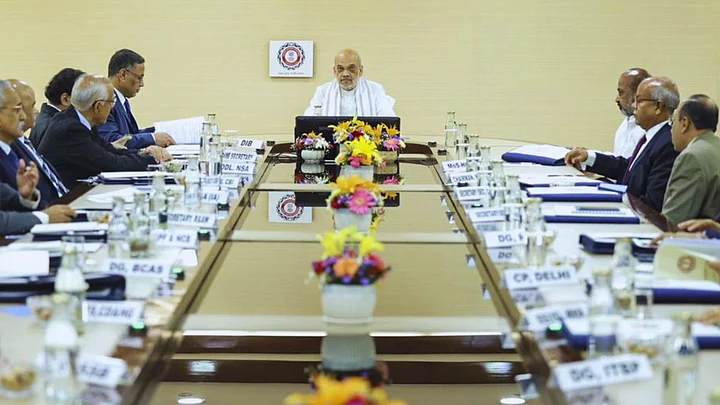The two-day National Security Strategies Conference-2024 (NSSC) was held last week in New Delhi in hybrid mode where more than 750 officers amongst a unique mix of senior police leadership managing national security challenges, young police officers working at the cutting-edge level and domain experts of specialised fields participated and deliberated on conventional national security issues as well as the emerging ones.
Union Home Minister Shri Amit Shah, chairing the session on both days, said rogue drones and online frauds are now major security challenges. He also exhorted the young police officers to apply their minds to strategic solutions to combat the entire gamut of fraudulent financial transactions ranging from crypto to hawala.
In an era where technology evolves at breakneck speed, rogue drones and online fraud, while seemingly disparate, share a common thread – they exploit technological advancements to challenge traditional security paradigms, forcing a reassessment of defence strategies and cybersecurity measures.
Rogue Drones
Unmanned Aerial Vehicles (UAVs), commonly known as drones, have transitioned from novelty gadgets to potent security threats. Their accessibility, affordability, and the potential for weaponisation have made them a favoured tool for bad actors. In India, the threat of rogue drones has become increasingly apparent, with several high-profile incidents underscoring their potential for harm.
Very recently, in the ethnic conflict in Manipur, there have been reports of volatile explosives dropped via drones by militants to add tensions to the already disturbed situation.
One of the most alarming examples occurred in June 2021, when drones were used to attack the Indian Air Force station in Jammu. This unprecedented assault marked the first time that drones were employed in an attack on an Indian military installation. The incident sent shockwaves through the security establishment, highlighting the urgent need for counter-drone technologies and strategies.
The threat extends beyond military targets. In Punjab, a state bordering Pakistan, there have been numerous instances of drones being used to smuggle weapons, ammunition, and narcotics across the border. These incidents not only compromise border security but also fuel internal conflicts and organised crime.
The challenges posed by rogue drones are multifaceted. Their small size and low flight altitude make them difficult to detect using conventional radar systems. Moreover, the rapid pace of drone technology development often outstrips the implementation of regulatory frameworks and defensive measures.
Online Fraud
While rogue drones pose a physical threat, online fraud represents a digital menace that is equally, if not more, pervasive and damaging to national security. India, with its rapidly growing digital economy and large population of internet users, has become a prime target for cybercriminals.
The scale of online fraud in India is staggering.
According to the National Crime Records Bureau, cybercrime cases increased by 12.9 percent in 2022 compared to the previous year, with online fraud being a significant component. These crimes range from simple phishing scams to sophisticated attacks on financial institutions and critical infrastructure.
The COVID-19 pandemic has spawned a new wave of online fraud. Scammers have exploited fears and uncertainties surrounding the virus to launch phishing attacks, create fake charity websites, and spread misinformation. These activities have increased in the last couple of years.
The Indian Cybercrime Coordination Centre (I4C) was set up by the union government in 2019 under the MHA to rein in this menace. Today there are more than 70000 complaints on the nationwide helpline number 1930 as well as the reporting portal. Apart from financial losses, there is an undermining of public trust and social stability – key components of national security.
Convergence of Physical and Digital Threats
The dual threat of rogue drones and online fraud is not an isolated challenge. Both can amplify each other's impact. For instance, drones can be used to conduct physical reconnaissance for cyber attacks on critical infrastructure. Conversely, online fraud can be employed to finance drone operations or disseminate instructions for drone-based attacks.
This convergence of physical and digital threats presents a complex challenge for India's national security apparatus. It necessitates a holistic approach that bridges the gap between traditional defence mechanisms and cybersecurity measures.
For rogue drones, India has begun implementing counter-measures such as the installation of anti-drone systems at critical locations and the development of drone detection radars. The government has also introduced stricter regulations for drone ownership and operations.
In the realm of online fraud, efforts are underway to strengthen cybersecurity infrastructure and enhance digital literacy among the population. The Indian Computer Emergency Response Team (CERT-In) plays a crucial role in coordinating responses to cyber incidents and disseminating best practices. But much more needs to be done.
However, the dynamic nature of these threats demands continuous innovation and adaptation. Collaboration between government agencies, private sector entities, and international partners will be crucial in developing robust defence mechanisms and staying ahead of malicious actors.
The NSSC needs to ensure more capacity development and tactical responses to these twin threats. As India continues its trajectory towards becoming a global power, its ability to effectively counter these dual threats will be a key determinant of its national security posture.
(Subimal Bhattacharjee is a Visiting Fellow at Ostrom Workshop, Indiana University Bloomington, USA, and a cybersecurity specialist. This is an opinion piece. The views expressed above are the author’s own. The Quint neither endorses nor is responsible for them.)
(At The Quint, we question everything. Play an active role in shaping our journalism by becoming a member today.)
